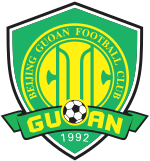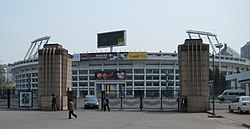Beijing Sinobo Guoan
 |
|
| Full name | Beijing Sinobo Guoan Football Club 北京中赫国安足球俱乐部 |
|---|---|
| Nickname(s) | The Imperial Guards 御林军 |
| Founded | 1951 (Semi-professional) December 29, 1992 (Professional) |
| Ground | Workers' Stadium, Beijing, China |
| Capacity | 66,161 |
| Owner |
|
| Chairman | Zhou Jinhui |
| Head coach | Roger Schmidt |
| League | Chinese Super League |
| 2017 | Super League, 9th |
| Website | Club website |
| Beijing Guoan | |||||||||||
| Chinese | 北京国安 | ||||||||||
|---|---|---|---|---|---|---|---|---|---|---|---|
|
|||||||||||
| 工体 | |
 |
|
| Location | Chaoyang District, Beijing |
|---|---|
| Owner | Beijing Municipal Bureau of Sports |
| Capacity | 66,161 |
| Surface | Grass |
| Construction | |
| Broke ground | September 5, 1958 |
| Opened | September 13, 1959 |
| Architect | Ouyang Can |
| Tenants | |
|
1st~4th, 7th National Games 1990 Asian Games 2001 Summer Universiade 2004 AFC Asian Cup 2008 Summer Olympics |
|
Beijing Sinobo Guoan F.C. (Chinese: 北京中赫国安; pinyin: Běijīng Zhōnghè Guó'ān) is a professional Chinese football club that currently participates in the Chinese Super League under licence from the Chinese Football Association (CFA). The team is based in the Chaoyang District in Beijing and their home stadium is the Workers' Stadium with a seating capacity of 66,161. Their shareholders are the real estate company Sinobo Group (64%) and CITIC Limited (36%) of CITIC Group, a state-owned enterprise of China. Beijing Guoan F.C. was founded as a professional team by CITIC Guoan Group, which was a subsidiary of CITIC Group until 2014.
The club's predecessor was called Beijing Football Club and they predominantly played in the top tier, where they won several domestic league and cup titles. On December 29, 1992 the club was recognized to become a completely professional football club making them one of the founding members of the first fully professional top tier league in China. Since then they have gone on to win their first ever professional league title in the 2009 league season as well as the 1996, 1997 and 2003 Chinese FA Cup.
According to Forbes, Guoan was the second most valuable football team in China, with a team value of US$167 million, and an estimated revenue of US$30 million in 2015. According to the disclosure of CITIC Pacific, the club revenue was CN¥244 million in 2013 season. In 2015 season, the sponsorship from CITIC Securities was CN¥25 million.
The club's first incarnation came in 1951 when the local government sports body decided to take part in China's first fully nationalized national football league tournament and decided to form a football team with the best players from Beijing and Tianjin to create the North China team. The team name was taken from the football team in the 1910 multi-sport event Chinese National Games that also represented the same regions. The team ended up finishing fourth in their debut season and with the football league gradually expanding, the players from Beijing and Tianjin were allowed to separate and the local Beijing government sports body was allowed to reform the club as Beijing Football Club in 1955. The club would make its debut appearance in the 1956 season and wore an all white home kit and all red away strip. In the 1956 campaign the club were also allowed to enter their youth team called Beijing Youth B who actually went on to win the league title while Beijing came sixth that season. The club would strengthen their hold on the following seasons when they went out and won the 1957 as well as the 1958 league titles. With these results, the club would become a major force within Chinese football, and with the club's youth team still participating within the top tier, there was a constant supply of players coming into the team to fight for places. Being China's capital city and for their success on the field, the club would become a feeder team for the Chinese national team. This often saw the club unable to complete a full championship schedule and the youth team were often used to represent the club, which did little to diminish Beijing football and actually resulted in the youth team to win the 1963 championship for the second time, showing the strength in depth of the region of Beijing football until 1966 when the Chinese Cultural Revolution halted football within the country. When football returned to the China, Beijing would win the 1973 league title in the newly re-established footballing league. While Beijing once again re-established themselves as major title contenders, they didn't win any major titles until 1982 league title, which was then followed by the 1984 league title and 1985 Chinese FA Cup title. After this period, the club would start to decline in their performances and were relegated for the first time in their history at the end of the 1988 season, however, their time within the second tier was short lived and they won the division title and promotion to the first tier at the end of the 1990 season. In total, Beijing would have won the league title five times during the old Chinese National Football League era before the club was given full professionalism in 1992.
...
Wikipedia
